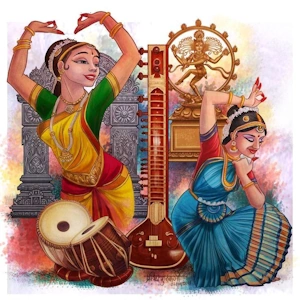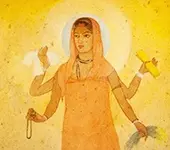Our Culture Is Strong Because It Is Based On Eternal Truth

Why is our culture, the culture of Bharata Varsha, so strong and it keeps on growing day by day? Because the source of our culture is Vedas.
What has set the direction of our march as a nation is the Vedas. Vedas have set the direction and momentum of our march.
You may not have seen the Vedas, you may not even know what is in there. But your day-to-day life is guided by Vedas — what our wise elders have set forth as our path.
We know this. You might have seen people who feed the needy, who help others. Many of them don’t follow any particular religion. Many of them hate religions and religious institutions. But where does this value come in them, this quality come in them? From where did we learn to feed the hungry, help the needy? It is in the system. It is in our blood.
Where did this come from? From the Vedas. From where else?
We have faced onslaught of alien cultures. Still, we stand firm as a rock. This is because our foundation is strong. We have as our foundation something very strong — spirituality, Vedas.
Ancient Greece had a culture founded on art. It perished.
Ancient Rome had a culture based on politics. It perished.
We are still there. No harm has been done to the soul of our culture — in spite of repeated invasions and deliberate attempts which continue even today.
This is because our culture is based on values that are eternal — found in the Vedas. That is why we call it Sanatana Dharma — the eternal Dharma.
This is not for the promotion of a particular school of thought or a cult or a person. They don’t survive.
We have seen this — big spiritual institutions built by individuals, promoting specific agendas which turn these institutions into cults. Then the Swamiji dies, and they turn into bookshops or community halls for conducting marriages and other ceremonies. Such institutions don’t survive beyond a few decades. Then they are gone.
Sanatana Dharma survives eternally, remains the foundation of our culture because the values therein are eternal — values from the Vedas.
Art is secular — but has art created a sustainable nation or a culture?
Politics can be secular — but which political thought has survived? They come and go.
Business is secular — but where are all the traders, like the British East India Company, or the Arab traders or the Chinese traders? They were there for some time, then they disappeared. There is no continuity.
An average man who is completely immersed in his day-to-day issues — he, sometime or the other, gets a wake-up call. From somewhere. It could be a devotional song, it could be a WhatsApp forward, it could be a book, it could be a talk — something. Sometime he gets, which connects him to the universal truth.
This universal eternal truth doesn’t have a planned agenda. It doesn’t have a conversion target. It doesn’t have budgets. But it happens on its own. When everything else is driven by money, in Sanatana Dharma it happens on its own. Because this is natural.
This call is not about an individual. It is not — come to me, I will show you the path. This is a common call. This call is not to a particular community. It is to everyone. These calls are not restricted to any geography or age group. They are for everyone.
Other nations — they talk about an ex-president or an ex-ruler — Abraham Lincoln, Winston Churchill, Idi Amin Dada. What are the names that circulate most and are taken most in India, in Indian culture, in Indian society? Rama, Krishna, Vyasa, Shankaracharya, Swami Vivekananda, Ramana Maharshi, Goswami Tulsidas.
Our bestsellers are still spiritual books — not Mills and Boon, not Is Paris Burning, or Virtue of Selfishness. Because our culture is based on eternal truth — the Vedas.

English
Bharat Matha
Click on any topic to open
7
30
Astrology
Atharva Sheersha
Bhagavad Gita
Bhagavatam
Bharat Matha
Devi
Devi Mahatmyam
Ganapathy
Glory of Venkatesha
Hanuman
Kathopanishad
Mahabharatam
Mantra Shastra
Mystique
Practical Wisdom
Purana Stories
Radhe Radhe
Ramayana
Rare Topics
Rituals
Rudram Explained
Sages and Saints
Shiva
Spiritual books
Sri Suktam
Story of Sri Yantra
Temples
Vedas
Vishnu Sahasranama
Yoga Vasishta